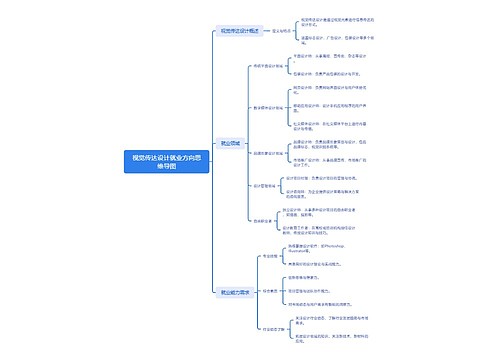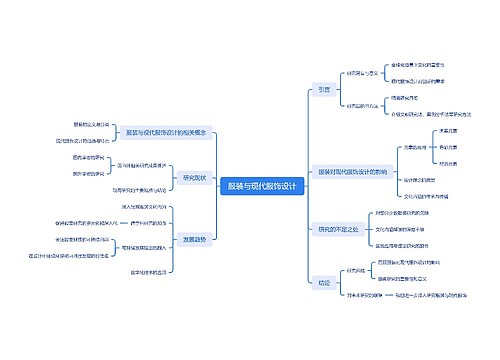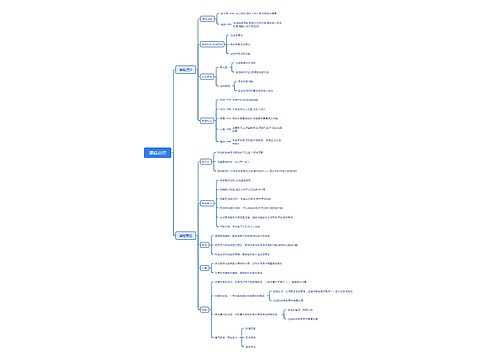
A brief history of second language teaching思维导图
U491103307
2025-02-21

两个主要角色
为什么要以学习者为中心
规划学习者培训
第二语言教学简史内容
树图思维导图提供《A brief history of second language teaching》在线思维导图免费制作,点击“编辑”按钮,可对《A brief history of second language teaching》进行在线思维导图编辑,本思维导图属于思维导图模板主题,文件编号是:7e750a12d723480ac543bf81d856d3aa
思维导图大纲
相关思维导图模版
A brief history of second language teaching思维导图模板大纲
Latin language teaching
(一)
h
renaissance movement
(二)
L
1、A dead language
2、A dominant language of education , commerce , religion , and government in the Western world .
3、used to read literature -" The language of scholars ".
4、It became a brain sport ( mental gymnastic )- a systematic study of abstract grammar rules , lists of vocabulary , and translation of sentences .
(三)Principal characteristics :
1.Goals:read literature;gain mental discipline;intellectual development
2. Focus:reading and writing
3. Vocabulary Development:bilingual word lists;dictionary study;memorization
4. Basic Teaching Universal Sentence
5. Emphasis on accuracy ( written exams )
6. Style: deductive and systematic .
7. Medium of instruction: taught in native language
(四)Remarks
1.Widespread but no advocates
2.no literature that offers a rationale for it
3.or that attempts to relate it to issues in linguistics , psychology , or education theory
二、Innovations in the nineteenth century
(一) Background :
1、demand for oral proficiency in FL
2、failure of public education
3、development of new approaches to LT
(二)Leading figures on innovation
1.Marcel ( French -1793-1896)
used child language learning as a model
emphasized the importance of meaning
proposed that reading should be taught first
2.T . Prendergast ( English -1806-1886)
noticed that children use context clues and memorize phrases --- proposed that learners should memorize basic structural patterns
3.F . Gouin ( French -1831-1896)
noticed that children learn through using organized learning into situations and themes
advocated teaching new items in context and using gestures and actions to convey meaning
(三)
e
These specialists were all linguists , not teachers , so their ideas didn ' t really get used in classrooms .
1. Their attempts were based on observations of children L1 learning .
2. There lacked an established circles of education and means of testing and applying their ideas .
3. No sufficient organizational structure to develop their ideas into an movement .
4. In any case , their efforts laid the foundation for more widespread reforms in LT
三、The reform movement
(一) Background :
1880s
Henry Sweet ( English ), Wilhelm Vietor ( German ) and Paul Passy ( French ) emphasized speech more than written word
Phonetics - the scientific analysis and description of the sound system of languages - was established .
(二)Their advocates
1.The study of the spoken language
2.Phonetic training in order to establish good pronunciation
3.The use of conversation texts and dialogues to introduce conversational phrases and idioms
4.An inductive approach to the teaching of grammar
5.Teaching new meanings through establishing associations within the target language rather than by establishing associations with the mother tongue
(三)A Movement , Not a Method
1.Though principles they set forth provided theoretical foundations for a principled approach to language teaching and reflected the beginnings of the discipline of applied linguistics , none of the proposals assumed the status of a method .
2.The efforts led to natural methods or the direct method.
四、The direct method
(一)Explanation
1.From Natural Method .
2.The advocates ( Gouin , Montaigne , L . Sauveur and F . Franke ) all attempted to develop teaching methodology around observation of children learning their first language naturally .
(二)Arguments
1.FL taught without translation or use of learner ' s mother tongue ;
2.Direct association between forms and meaning in T ;
3.Direct , active and spontaneous use of TL in interactive classroom ;. No explanation of grammar rules by teacher , but induction by learners ;
4.Speaking starts with pronunciation ; and new words taught with known words , gestures and pictures
5.Hard to implement in public schools , thus no followers .
(三)The meaning of the Direct Method
1.the learning of language in a relevant setting . This method has one basic rule that no translation is allowed . The meaning of the name " Direct Method " comes from the fact that meaning is to be conveyed directly into the second language through demonstration and visual aids .
2.In France and Germany , it was called Natural Method or the Direct Method , and in the United States , it was referred to as the Berlitz Method ( used in Berlitz chains of private school ).
(四)Main principles
1. Mother tongue is not used in the classroom
2. The learner is actively involved in using the language in realistic everyday
situations .
3.Students are encouraged to think in the target language .
4.Speaking is taught first before reading or writing .
5.Only everyday vocabulary and sentences are taught .
6.Concrete vocabulary is taught through demonstration , objects , and pictures .
7.Abstract vocabulary is taught by association of ideas .
8.This method states that the printed word should be kept away from the second language learner for as long as possible .
The more you know the nature , the more ways you can have.
1、linguistics : what is language ? (what to teach )
2、psychology : how is language learned ? (how to teach)
(一)the act of getting close to way , path , road
(二)In language teaching , approach is a set of assumptions dealing with the nature of language teaching and learning . It describes the nature of the subject matter to be taught …
一、Two factors which determine the approach and method
(一)Proficiency ( the needs for LL )
(二)Theories of language and language learning
二、What is an approach ?
(三)a theory of the nature of language
1.Contents
(1)an account of the nature of language proficiency
(2)An account of the basic units of language structure.Basic units of language structure : letter , word , phrase , sentence , discourse
(3)phonology is important ?
(4)meaning and form , which is more important ?
2.Three views
(1)structural
(2)functional
(3)interactional
(四)a theory of the nature of language learning
1.Three views
(1)behaviorism
(2)cognitivism
(3)humanism
(五)Situational language teaching
1.Introduction
(1)an approach developed by British applied linguists in the 1930s to the 1960s
(2)derived from the Direct Method
(3)more systematic in terms of the principles and procedures that could be applied and the selection of the content of a language course .
(4)situation means concrete objects , pictures , and realia , which together with actions and gestures can be used to demonstrate the meanings of new language items
2.Background
(1) the Direct Method is unfavored
(2)British Harold Palmer and A . S . Hornby developed the foundation for more scientific approach .
(3)The work of the British phonetician Daniel Jones and the Danish linguist Otto Jespersen
3.The theory of language
(1) British structuralism
(2) Speech was regarded as the basis of language , and structure was viewed as being at the heart of the speaking ability .
(3) knowledge of structures must be linked to situations .
(4) Language viewed as purposeful activity related to goals and situations in the real world .
(5) Principal classroom activity : oral practice of structures in situations designed to give the greatest amount of practice in English speech to the pupil .
3.important factors
(1)systematic approaches to the lexical and grammatical content of a language course
(2)Palmer , West and Hornby : using these resources as part of a comprehensive methodological framework for teaching of English as foreign language
4.Main Features of SLT
(1) Teaching begins with the oral language
(2) Target language is the medium .
(3) New language items are taught situationally .
(4) Service vocabulary is covered .
(5) Grammatical items are graded and taught from simple to complex ones .
(6) Reading and writing are introduced on the basis of sufficient vocabulary and grammar .
(六)Communicative language teaching
1.Background
European changing educational realities - teach more adults European languages . The work of the Council of Europe. Wilkins - Notional Syllabus. others , such as Widdowson , Candlin , Christopher Keith Johnson and other British applied linguists on the theoretical basis for a communicative or functional approach
2.Other names
referred as the Communicative Approach , or communicative Language Teaching .
Sometimes called notional - functional approach and functional approach .
3.Theory of language
Theory of language as communication , the goal of language teaching is to develop communicative competence , this is to contrast Chomsky ' s theory of competence . According to Canale and Swain,the goal of language teaching : communicative competence ,contrastive to Chomsky ' s theory of competence :grammatical,sociolinguistic,discourse,strategic.
Chomsky : characterize the abstract ability speakers possess that enable them to produce grammatically correct sentences in a language .
summary
Language is a system for the expression of meaning
The primary function of language is for interaction and communication
The structure of language reflects its functional and communicative uses .
The primary units of language are not merely its grammatical and structural features , but categories of functional and communicative meaning as exemplified in discourse .
4.Theory of learning
Through CLT practice :
(1) Communication principle : activities that involve real communication promote learning
(2) Task principle : activities in which language is used for carrying out meaningful tasks promote learning
(3) Meaningfulness principle : language that is meaningful to the learner supports the learning process .
5.two aims
(1)make communicative competence the goal of language teaching
(2)develop procedures for the teaching of the four language skills that acknowledge the interdependence of language and communication .
6.Two versions
Strong and weak version :Learning to use;Using to learn (Learning by doing or the experience approach)
7.Design
general objectives : commmunicative competence
(1)Knowledge of grammar and vocabulary of the language
(2)Knowledge of rules of speaking .
(3)Knowing how to use and response to different types of speech acts .
(4)Knowing how to use language appropriately .
specific objectives
(1)Integrative and content level ( language as a means of expression )
(2)Linguistic and instrumental level ( semiotic system and an object of learning )
(3)Affective level of interpersonal relationships and conduct ( language as a means of expressing values and judgments about oneself and others ).
(4)A level of individual learning needs ( remedial learning based on error analysis )
(5)A general educational level of extra - linguistic goal ( language learning within the school curriculum )
8.Syllabus
The notional syllabus ( by Wilkins ).
The Council ofEurope : specify
(1)The situation
(2)The topics
(3)The functions
(4)The notions
(5)Grammar and vocabulary
8.Types of learning and teaching activities
(1)Often designed to focus on completing tasks that are mediated through language or involve negotiation of information and information sharing
(2)Littlewood distinguish functional communication activities and social interaction activities
9.Teacher roles
Two major roles :
(1)facilitate the communication process
(2)act as an independent participant with the learning - teaching : organizer , guide , researcher and learner
(3)Other roles : analyst , counselor , and group process manager
10.The role of instructional materials
(1)A wide variety of materials can be used Text - based materials
(2)Task - based materials : games , role plays simulations ...
(3)Realia : authentic and from - life materials of instruchonal materials
11.Comments :
Generally an approach rather than a method
· Several considerations :
·--- whether it can be applied at all level
--- suited for ESL and EFL
·-- whether it requires existing grammar - based syliabus to be abandoned or
merely revised
·--- how such an approach can be evaluated
·--- how suitable it is for non - native teachers
·--- how it can be adopted in situations where students must continue to take grammar - based tests
(七)learner - centeredness
1.Definitions of Learner - centeredness :
a broadly based endeavor designed to gear language teaching, in terms of both the content and the form of instruction, around the needs and characteristics of learners . Learner - centered education places the student at the center of education. It begins with understanding the educational contexts from which a student comes. It continues with the instructor evaluating the student ' s progress towards learning objectives. By helping the student acquire the basic skills to learn, it ultimately provides a basis for learning throughout life. It therefore places the responsibility for learning on the student, while the instructor assumes responsibility for facilitating the student ' s education. This approach strives to be individualistic, flexible, competency - based, varied in methodology and not always constrained by time or place.
2.Two main components:
(1). language teaching needs to acknowledge and work with language learners as complex and varied human beings , not just in individual but also in social and cultural terms.
(2). language teaching is an educational endeavour which should seek to empower learners by enabling them to assume an informed and self - directive role in the pursuance of their language - related life goals .
3.Implication of a learner - centred approach to teaching :
(1).language teaching needs to acknowledge and work constructively with the diversity and richness of human experience that learners bring with them to their language study - which leaves little scope for neat , pre - packaged solutions to language teaching problems.
(2).The second implication arises out of the participatory or negotiative approach to decision - making which it recommends.
4.why is there learner - centeredness ?
(1)The evidence is abundant and accumulating that motivation , learning , and achievement are enhanced where learner - centered principles and practices are in place - practices that address the personal domain , which is often ignored .
(2)The benefits of learner - centered practice extend to students , teachers , administrators , parents , and all other participants in the educational system.
(3)The changes in our society necessitate a change in the role and function of schools so that they better meet the needs of the learner as a whole person , whether that person is a student , teacher , administrator , or parent .
(4)Change itself requires a transformation in thinking ( and thus a process of learning ); this transformation can be facilitated by an understanding of basic principles about learning and learners .
5.how comes learner - centeredness ?
4 stages——Gradual development :
(1)humanistic approach
Humanistic language teaching--- five main strands of humanistic psychology:(1)feelings (2)social relations (3) responsibility (4)intellect (5)self - actualisation
the humanistic movement--- Curran ' s CLL , Gattegno ' s silent way , Asher ' s TPR .·--- the humanistic movement has made a considerable contribution to the language teaching community ' s understanding of what learner - centered teaching can entail , and it has expanded the range of insights and pedagogical resources available to teachers. However, it fails to take sufficient account of learner variability and of the ways in which this influences the processes of teaching and learning .
(2)communicative teaching
(3)learner strategy study
good language learner study :It provided an invaluable impetus to the development of a more learner - centered perspective on language teaching: it is an attempt to listen to learners and to use learners own insights and preferences to shape language teaching practice, it also provided our profession with the methodological and conceptual parameters which have guide subsequent research into learner training and learner autonomy.
(4)Individualization
One in which the structure of the program - presentation and composition of content, role definition of teacher and learner, system of evaluation - is allowed to be flexible in and effort to accommodate, to the extent possible, the interests , needs and abilities of individual learners. However , individualized instruction tended to be very materials and teacher - centered.
6.current practice
(1)
r
.activity organization
The advantages of the activity organization
t
four types of activities :
s
.
e
Definition:
undefined
Huttenen succinctly but pertinently defines autonomy as ' the willingness and ability of the learner to take responsibility for his own learning.
five capacity :
they understand what is being taught
they are able to formulate their own learning objectives
select and make use of appropriate learning strategies
monitor their use of these strategies
self - assess , or monitor their own learning .
course design:
The learners should be taken as the reference point for decision - making as regards both the content and the form of teaching, and that this should be achieved via a process of consultation and negotiation between teacher and learners.
(2)Goal-education as a means of empowerment
Explanation:
t
Learner empowerment is the result and practical realization of language education . It relates to learner ' s ability to assume an active and informed role in their language study and , ultimately , to pursue those of their life goals which pertain to language use and learning in a self - directive manner.
More personal involvement:the most able and the least able
Compensatory teaching
7.how to be learner - centered ?
(1)learner training
Introduction:
A learner - centered approach needs to contain an element of awareness development , which is designed to help learners deepen their understanding of language learning and develop their ability to play an active and self - directive role in their language study .
Two processes
a gradual ' deconditioning ' process : to break away from a prior judgments and prejudices about language and language learning
a gradual process of acquiring the knowledge and know - how
Three target areas of training :
language learning and language learning processes
language structure and language use : the nature of language and of language use
the learners themselves as language learners : help learners to look at themselves as language learners , and to take stock of their motivation , their attitudes to learning and their willingness to invest time and effort in their language study
Planning learner training
A pedagogical undertaking which involves a number of choices with respect to the content , form and structuring of instruction.
Content : cognitive and metacognitive strategies
Explicitness of purpose
Integration : learner training must inevitably be integrated with language study activities : various possibilities exist , with respect to the nature and degree of its integration . The less integrated the training , the greater the effort learners must make to transfer the insights potentially available in the learner training materials into their own language study
Evaluation :
reference points for the evaluation of learner training activities :
learner attitudes : has learners appreciation of learner training changed?
skill acquisition
task improvement
Durability : does the skill continue to be utilized?
transfer : is the skill utilized in similar context?
(2)needs analysis
Objective needs analysis
Classification
Deficiency analysis or present situation analysis ( PSA ) is a logical counterpoint to TSA , it involves the analysis of learner ' s current abilities with respect to their intended uses of the language . PSA is thus complementary to TSA , and should be used in conjunction in order to establish and prioritise learning objectives.
Strategy analysis is designed to assess learner ' s current awareness of the processes of language study , the learning strategies and the expectations with which they approach their language study .
Means analysis , or contextual factors analysis : covers sociopolitical variables ( the attitude of the government or the status of the TL ),administrative variables ( trained teachers material )psychopedagogic ( learners motivation and expectations traditional learning styles ) and methodological variables ( can be a individual part )
Procedures
Questionnaires and interviews
Observation
Case study
Authentic data collection , which involves the collection and analysis of data from the target situations , possibly by means of audio or video recordings of interactive exchanges , or the gathering of written materials
Qualified informants
Simulation - based needs analysis
Projective simulation : look forward to the learners ' target situations of use and try to prepare them to operate in these situations
Remedial simulations : relate back to situations learners have already found themselves in and which have caused problems in one way or another , the simulation then offers the learner the
possibility to re - enact the situation and identify where and why the problems arose , and how they might be resolved.
Learner diaries
Records kept by learners themselves of their use and learning of the TL. The simplest form is the ' difficulties diary ' records the problems learners have experienced in their use of the language over a given period of time
Subjective needs
Explanation
the cognitive and affective needs of the learner in the learning situation , and can be identified from information about affective and cognitive factors such as personality , confidence , attitudes , wants and expectations with regard to the learning of the TL and their individual cognitive style and learning strategies.
Individual difference will be taken to be those psychological or cognitive continua along which learners differ form one another , and which may have a bearing on their interaction with their language study . Learning style is seen as the combined result of variance on the range of psychological and cognitive factors falling under the heading of individual differences insofar as they influence learners ' preferences for different study mode and activity types : learning style will thus be taken to be the tangible manifestation of individual differences
Individual difference
Introversion / extroversion
Tolerance of ambiguity and risk - taking
Anxiety and self - esteem
Cognitive style
age attitudes
(3)contextual dimension
Introduction:
Contextual factors play a significant role in creating the learning environment in which language study will occur . Consequently , learner - centered teaching has to be pursued in a socially and contextually sensitive manner , in harmony with social and moral norms , traditions and expectations of the community within which teaching takes place ." learning a language is not just a mental process but a process of negotiation between individuals and society
Three categories:
(1)The framework of goals within which learning will be conducted : do learners ' goals arise out of essentially personal factors , or are they shaped more or less directly by the demands of the social context .
(2)The practical conditions under which teaching will be conducted : class size , the range and quality of both teaching and learning facilities that are available , the logistical factors , teacher training and development .
(3)The learning culture and traditions of learning present both in the educational system concerned and in the community as a whole : the learner ' s attitudes , beliefs and behaviour of other participants .
(4)self - assessment
Introduction:
Self - assessment plays a crucial role both in language education and in terms of learner empowerment . The reasons for this are clear : if learners are to be in a position to operate self - directively , they must have the ability to assess
six main reasons
· promotion of learning
· raised level of awareness
· improved goal - orientation
· expansion of range of assessment
· share assessment burden
· beneficial post - course effects : a skill crucial to subsequent learning , in contexts where they will not have assess to the evaluative advice of a teacher
How do we self - assess ?
Global self - assessment :
partial skill description + self - rating scale
situation outline + partial skill description + self - rating scale
expanded skill description + self - rating scale
Situation outline + task specification
Developing strategic learning awareness
Self - assessment pays a central role in the development of learners ' self - directive abilities as it involves learners :
looking forward to their ultimate learning goals
evaluating their current ability to fulfill these goals setting attainable learning objectives
planning learning activities designed to help them achieve these objectives
(5)teacher ' s perspective
Ideas on how to make lessons more learner - centered
Get learners actively involved
Encourage trial - and - error learning
Give clear guidelines
Be flexible
Emphasize problem solving
Practice decision making
Use technology and teaching aids to enhance learner centred activities
Use continuous assessment
Make the learning experience relevant
Teaching the " whole " child
Start with what learners have and build on
Teach concepts and not unrelated facts
Allocate time for learning while doing tasks
Encourage choice
Allow learners to teach learners
Be patient
(一)way of doing sth
(二)Method is an overall plan for the orderly presentation of language material , no part of which contradicts , and all of which is based upon , the selected approach . An approach is axiomatic , a method is procedural .
(三)Total physical response
1.Introduction
By Asher: A language teaching method built around the coordination of speech and action ; it attempts to teach language through physical ( motor ) activity .
2.
h
(1) Traces theory :more often or the more intensively a memory connection is traced , the stronger the memory association will be and the more likely it will be recalled . retracing can be done verbally ( e . g . by rote repetition ) and / or in association with motor activity . Combined tracing activities , such as verbal rehearsal accompanied by motor activities , hence increase the probability of successful recall .
(2)Developmental psychology:adult language learning is parallel to child first language acquisition. speech directed to young children consists primarily of commands , which children respond to physically before they begin to produce verbal responses .
(3)Humanistic psychology:focus on the role of affective factors in language learning . A method that is undemanding in terms of linguistic production and that involves game - like movements reduces learner stress , and creates a positive mood in the learner , which facilitates learning .
3.Theory of language
(1)Seems to be based on Structuralist or grammar - based views of language :" most of the grammatical structure of the target language and hundred of vocabulary items can be learned from the skillful use of the imperative by the instructor ."
(2)the verbs , and particularly the verb in the imperative , as the central linguistic motif around which language use and learning are organized .
4.Theory of learning
Behavioral psychology ( verbal stimulus - response )
5.Three learning assumptions
(1)Bio - program:There exists a specific innate bio - program for language learning which
defines an optimal path for first and second language development :listening before speaking ;
listening comprehension is acquired because children are required to respond physically to spoken language in the form of parental commands ;once a foundation in listening comprehension has been established , speech evolves naturally and effortlessly out of it .
order of skills learning :Listening - speaking - other skills
(2)Brain lateralization: defines different learning functions in the left and right - brain hemispheres :language is in the left hemi - sphere , while movement in the right - hemisphere . Asher holds that the child language learner acquires language through motor movement - a right - hemisphere activity . Right - hemisphere activity must occur before the left hemisphere can process language for production .
(3)Reduction of stress: Stress intervenes between the act of learning and what is to be learnt ; the lower the stress , the greater the learning : focusing on meaning interpreted through movement , rather than on language forms studied in the abstract , the learner is said to be liberated from self - conscious and stressful situations and is able to devote energy to learning
playful activities
6.Design
General objective is to teach oral proficiency at a beginning level . Comprehension is a means to an end , and the ultimate aim is to teach basic speaking skills .
7.Types of learning and teaching
(1)Imperative drills are the major classroom activity . They are typically used to elicit physical action and activity in the part of the learners .
(2)Conversation dialogues are delayed until after about 120 hours of instruction .
(3) Other activities include role plays and slide presentations .
(4)Role plays center on everyday situations , such as at the restaurant , supermarket , or … reading and writing activities may also be employed to consolidate structure and vocabulary and as follow - ups to oral imperative drills .
8.Learner roles
Listener and performer .
They are also encourage to speak when they feel ready to speak .
9.The role of instructional materials
· Generally no basic text .
· Materials and realia play an increasing role , however , in later learning stages .
10.Procedure
(1) Commands
(2) Role reversal
(3)Reading and writing
二、What is a method ?
三、What is a technique ?
(一)Technique : technical or mechanical skills
(二)A technique is implementational - that which actually takes place in a classroom . It is a particular trick , strategem , or contrivance used to accomplish an immediate objective . Techniques must be consistent with a method , and therefore in harmony with an approach as well .
四、What ' s their relations ?
(一)For approach , method , and technique , which determines which ?
approach determines method , in turn ,method determines technique .
(二)The arrangement is hierarchical . The organizational key is that techniques carry out a method which is consistent with an approach
查看更多
HarmonyOs思维导图
 U882124307
U882124307树图思维导图提供《HarmonyOs》在线思维导图免费制作,点击“编辑”按钮,可对《HarmonyOs》进行在线思维导图编辑,本思维导图属于思维导图模板主题,文件编号是:33b352332cd61ae9bda089308243d88b
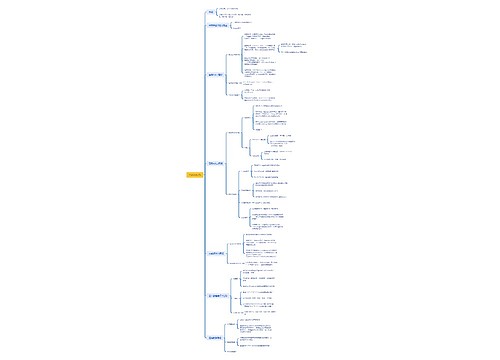
title: 2024-11-8未命名文件 tags: 影像诊断与手术后符合率统计与分析报告鱼骨图思维导图
 U880271396
U880271396树图思维导图提供《title: 2024-11-8未命名文件 tags: 影像诊断与手术后符合率统计与分析报告鱼骨图》在线思维导图免费制作,点击“编辑”按钮,可对《title: 2024-11-8未命名文件 tags: 影像诊断与手术后符合率统计与分析报告鱼骨图》进行在线思维导图编辑,本思维导图属于思维导图模板主题,文件编号是:f19c198bf7435acf7735ee5051a89d7b
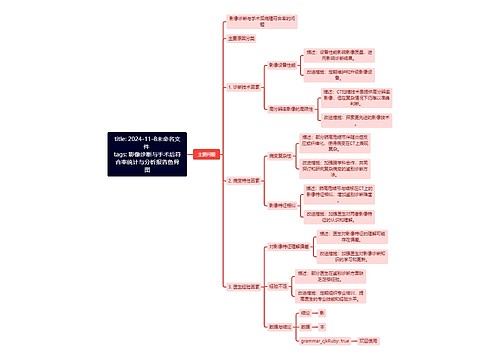
相似思维导图模版
首页
我的文件
我的团队
个人中心
